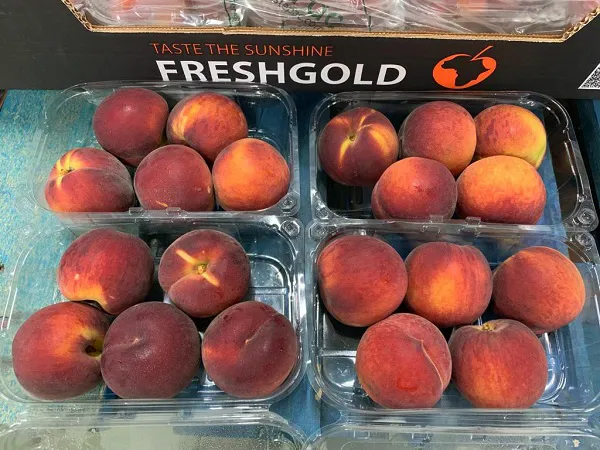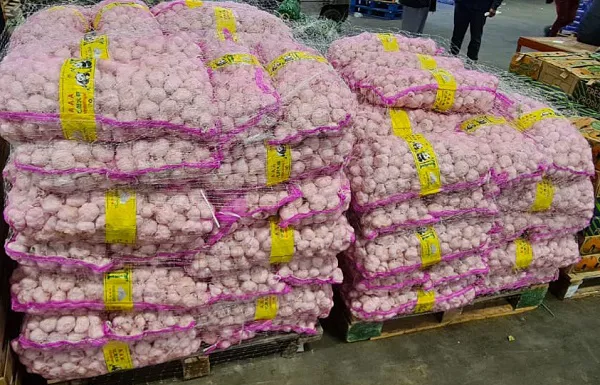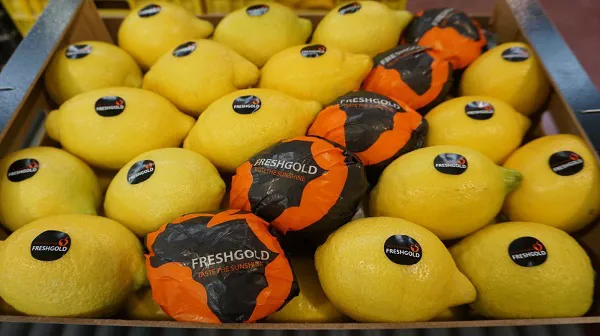The Fresh Produce Importers’ Association was set up ten years ago, the only association of its kind in South Africa, to facilitate the growing demand for year-round supply of certain fresh produce lines, for the local market and retail sector.
“As with most developing countries, the availability of fresh produce in South Africa on a year-round basis has become the norm. Consumers want a variety of quality fresh fruit when they feel like it and not necessarily when the particular fruit is in season. South Africa is no exception and imports of out-of-season fresh produce have grown tremendously over the past 15 years. For this reason, the Fresh Produce Importers Association of South Africa (FPIA) was established and became operational in 2011, to organise, facilitate and develop the fresh produce import sector in South Africa,” explains Marianna Theyse, general manager of FPIA.
 Spanish peaches imported by Freshgold for the South African market
Spanish peaches imported by Freshgold for the South African market
“Most of our commercial imports are fruit such as stonefruits from Spain, Bulgaria, the United Kingdom, Israel, and Morocco; kiwifruit are allowed to be imported from countries such as Greece, Italy and New Zealand; mangoes from Mozambique, Egypt, Israel, Spain; limes from El Salvador and Brazil, citrus from countries such as Egypt, Israel, Morocco, Spain; most banana and papaya imports are from Mozambique. Strawberries are flown in from countries such as Egypt, Ethiopia, or brought in via road from Zimbabwe.”
As for avocados, South Africa only imports during the local season when there is a supply shortage to address local availability from countries such as Kenya and Chile. Most of the country’s out-of-season imports (November to February) are from Spain and Israel, approximately 388,000kg fresh fruit for consumption. Importers supplying to the processing industry may also import fruit for processing only from Mozambique and Zimbabwe at this stage. In November 2021, the South African market also opened for avocado fruit from Tanzania.
Garlic is imported from countries such as Spain and China, with a lot of prepacked vegetables from African countries and various cucurbits (pumpkins, squash, marrow) from neighbouring countries.
 Imported Chinese garlic
Imported Chinese garlic
Import substitution on blueberries
“Blueberries is an interesting value chain, however, where imported volumes have been impacted on local industry growth: our focus initially was on developing new markets but as the South African production season lengthened with the continued growth and expansion of production areas, the demand for new markets is now very focused on a small import window."
She continues: "Currently we can import blueberries from Poland, New Zealand, Zimbabwe and Namibia. We are looking forward to conclude market access initiatives with Spain, Morocco and the USA.”
In the pipeline are apples from Portugal and Germany, mangoes from India, Pakistan and Malawi, citrus from China and stonefruit from Egypt and Zimbabwe (for the latter, fruit fly mitigation, among others, is currently being assessed).
Ecuadorian bananas in a South African retailer
SPS issues have the potential to quickly escalate
In the early years FPIA’s focus was to organise the industry and establish linkages with the relevant regulatory authorities to address sanitary and phytosanitary (SPS) issues (which, she points out, are liable to change very quickly due to new pests emerging) to ensure safe imports of products from markets that may pose a phytosanitary (plant health) risk to South Africa’s fruit industry.
“We have over the last ten years developed a good working system within our industry and especially with the Department of Agriculture, Land Reform and Rural Development, whereby we can identify potential issues fairly early, have effective consultations and communications, to address SPS issues before they become trade disruptive,” she says.
Maintaining existing markets is just as important, she points out, especially because of potential SPS issues that can quickly become trade barriers if not addressed and mitigated promptly and effectively.
“Fruit flies have been a major challenge in the African region on many of our existing markets for fruit and vegetable imports. Working with trade partners (exporters), NPPOs and technical experts to profile risks associated with emerging pests is an important function of the FPIA.“
Revised import protocol for Turkish cherries expected before 2022 import season
In 2011, Spanish stonefruit imports were suspended due to a high volume of interceptions of the Monilinia fructicola fungus in the preceding years, which led to a sudden absence of counter seasonal stonefruit on supermarket shelves.
Paraguayos, or flat peaches from Spain, South Africa's foremost supplier of out-of-season stonefruit
“This was one of our first big challenges in our first year: re-opening the Spanish market. So, in close collaboration with our technical experts and the National Plant Protection Organisation of South Africa, a revised protocol was developed based on risk assessment which is currently still in place and makes use of an integrated systems approach for managing pest risk on imports. By 2012 the market was re-opened for Spanish stonefruit with trade and the new protocol resulted in an 95% decrease in interception for non-compliance in its first year of use.”
Monilinia fructicola, which is a very high priority quarantine pest for South Africa, again cropped up, this time on Prunus salicina (Japanese plum) in Turkey’s Aegean region during surveys conducted in 2018. This resulted in a temporary suspension of cherry imports from Turkey by South Africa, to allow the two countries’ plant protection organisations to assess the situation and develop appropriate mitigation measures for the Turkey cherries that will mitigate the risk of introduction of the disease into South Africa.
“FPIA has been working closely with our Turkish trade partners and regulatory authorities and the outcome of the official surveys will confirm the pest status of Monilinia fructicola and will assist us to consider possible pest free area-specific imports, or alternatively an integrated systems approach for risk mitigation. We are hopeful that the technical issues will be addressed and the import protocol revised before the start of the 2022 import season.”
 Spanish lemons for South African consumers
Spanish lemons for South African consumers
New intra-African opportunities
Regional imports are important as the scope of production in the region grows and opportunities for great quality, competitively priced product (through more cost efficient transport/logistics) develops.
FPIA has successfully worked with Department of Agriculture, Land Reform and Rural Development (DALRRD) and their trade partners in the region towards the opening and re-opening of South African markets over the past 10 years, including new market access opportunities such as avocados from Kenya, Mozambique, Zambia and now Tanzania; mango from Mozambique, Egypt and soon also from Malawi; papaya from Mozambique and Eswatini; strawberries from Ethiopia; pineapples from Angola; citrus from Egypt and Morocco; table grapes from Zambia; litchis from Madagascar, Eswatini and Mozambique and bananas from Angola and Zambia.
South Africa provides a good opportunity for regional fresh produce trade, specifically for the purpose of agroprocessing, as well as for organic produce and spices like chillies, turmeric, peppers and cumin, she remarks.
 For more information:
For more information:
Marianna Theyse
FPIA
Tel: +27 12 667 1871
https://www.fpia.co.za/
